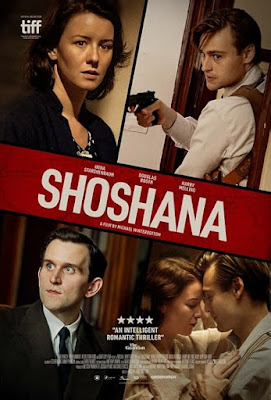It was a time of colonialism the “anti-colonialists” seem bizarrely nostalgic for. The indigenous Jewish people were organizing for the independence of Israel, but the British were clinging to their “Mandate of Palestine.” There were also Arab colonizers, hoping to replace the British colonizers, but they hardly factor in British filmmaker Michael Winterbottom’s Shoshana, which is now playing in New York.
Shoshana Borochov is an ardent socialist Zionist Russian émigré to Israel. She is also a member of the left-leaning underground independence group, the Haganah. Thomas James Wilkin is a Hebrew-speaking British colonial policeman tasked with disrupting the more aggressive Irgun. Their backgrounds are so different, their romance should not work, but it does, at least for a while.
Unfortunately, their relationship starts souring with the arrival of Wilkin’s new boss, Geoffrey Morton. In fact, that is true for British-Israeli relations in general. Morton intends to use the same tactics he successfully employed against Islamist insurrectionists against the Jewish independence groups. Unlike Wilkin, he makes no distinction between the moderate Haganah, the confrontational Irgun, and the “militant” (as they now say in the press, about other terrorist groups) Lehi, which split from Irgun, rejecting their de facto truce with the British for the sake of victory over Hitler.
Predictably, the more Morton cracks down, the more Israelis hate the British, especially Wilkin, because he is usually right next to his boss, wringing his hands, during torture sessions. However, Morton must resort to more forms of trickery, because recruiting Jewish informants proves much more difficult than it did when he targeted the Arab terrorist networks.
Somewhat counterintuitively, Winterbottom’s screenplay (co-written with Laurence Coriat and Paul Viragh) downplays Jewish-Arab tensions, focusing instead of British colonialist mismanagement and antisemitism. It also gives the Romeo & Juliet love affair equal footing with the political intrigue. Fittingly, Gershwin’s “The Man I Love” serves as a recuring soundtrack motif, often accompanying Borochov’s heart-achey voiceovers.
Douglas Booth and Irina Starshenbaum (the Russian-Jewish thesp, who was excellent in the Russian underground drama Leto) develop a lot of chemistry together. It is also fascinating to watch their characters evolve, especially Wilkin, who clearly understands he “is on the wrong side of history,” even though the film never uses that exact expression. Likewise, Borochov eventually accepts the level of commitment required to protect her dream of a free and independent Israel.
Frankly, Booth and Starshenbaum are the only cast-members who truly do the work of character-building in their performances. In contrast, Harry Melling is almost laughably twitchy and clammy as nasty Morton. Presumably, it was Winterbottom’s commitment to historical accuracy that prevented him from giving Morton a handlebar mustache for Melling to twist.
Yet, there is a fatalistically romantic vibe (in the tradition of Casablanca, but not nearly so powerful) that works surprisingly well. Winterbottom clearly establishes how tragic it is whenever politics interferes with affairs of the heart. He and production designer Sergio Tribastone, and the rest of the art and design team, also vividly recreate the look and textures of pre-1948 Israel. Flawed but engaging, Shoshana will appeal to fans of old school romantic historical dramas. It is now playing in New York, at the Quad and the AMC Empire.

